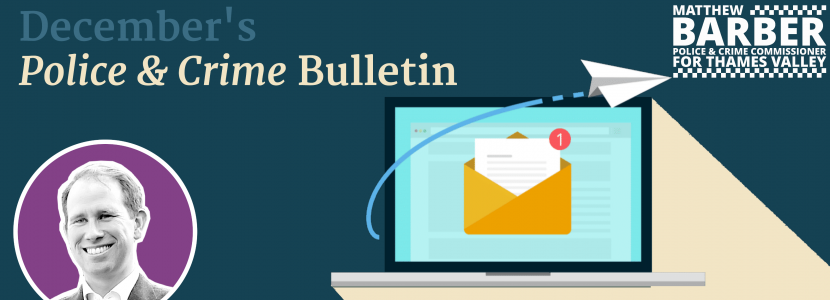
Serious violence lowest in the country, but the fight against knife crime continues
The statistics on knife crime in Thames Valley are remarkably positive. The lockdown restrictions that we all endured last year unsurprisingly had the side-effect of reducing many types of crime, but even taking this into account, serious violence, including knife crime is down and across Thames Valley.
The latest figures show that, by population, we currently have the lowest levels of serious violence of any police force in England and Wales.
This welcome trend is however no excuse for complacency. We’ve all seen the headlines that retell the tragedy of lives lost and families broken. These statistics that show the successes of proactive policing are of little comfort to those who have had loved ones ripped away from them in recent months through the unthinking violence of others. Too many families will face this Christmas with an aching wound that will never fully heal.
Effective though the approach by the police is proving to be, the problem is one that goes beyond law enforcement.
When knives are involved, the difference between a serious assault or a murder can be just a matter of inches, or the speed of the emergency response. This truth is even more stark when looking at the age of some of those involved. Although the police will be dealing with gangs and drug offences we’re often not talking about hardened criminals, but children who are making - sometime fatal - mistakes.
That’s why the police cannot solve this problem alone. My Violence Reduction Unit brings together schools, social services, the NHS and others, seeking to get ahead of the problem. Changing attitudes, identifying those at risk of becoming involved in violent crime and attempting to prevent things from escalating out of control.
We all have a role to play. If you know or suspect someone is carry a knife, please report it to the police by calling 101. Often people are nervous of criminalising family and friends, but early intervention will mean a proportionate response and may prevent the most serious consequences next year, next month or next week. Your call might save a life.
The approach of proactive policing, taking knives off our streets, whilst also working to stop young people picking up weapons in the first place is getting traction and we’re seeing those successes in falling rates of violent crime.
Of course for those who mourn lives lost or irrevocably altered there are no words of comfort I can offer to ease the pain this Christmas. The evidence is however that we’re moving in the right direction and there is hope that we will see fewer families suffering the same way in the future.
Rowe Court fire update
Following a fire on 15th December Thames Valley Police declared a major incident in Reading. Sadly at least one person is known to have died in the fire and two people are still missing as the building is made safe. These people’s next of kin have been informed at this very difficult time and are being supported by specially trained officers.
A 31-year-old man has now been charged with one count of murder and one count of arson with intent to endanger life. He appeared in court earlier this week and has been remanded in custody.
My Victims First team are offering support to anyone affected by the incident and can be contacted at victims-first.org.uk.
Reading Borough Council are supporting the families who have been displaced by the fire. Many people have generously offered support and donations. The best way to make a donation is at rdguk.info/donate_sTHEZ.
Seeking your views on Thames Valley Police budget
Police and Crime Commissioner for Thames Valley, Matthew Barber, has launched an online survey seeking views on the budget for Thames Valley Police for 2022/23.
On 16th December, the Home Office announced the funding settlement for police forces across the country for the next financial year. In Thames Valley, this means an additional £15.5m in Government grant to pay for a further increase of 244 police officers (including 13 for the South East Regional Organised Crime Unit, SEROCU) next year. The increase in officers is part of the national uplift programme that will see 20,000 additional officers across the country by March 2023. In the Thames Valley, we have already seen the positive effects of recruitment with more police officers than a decade ago and, in addition to the Home Office funded recruitment, Police & Crime Commissioner, Matthew Barber, is seeking to fund additional future growth to ensure that police officer numbers increase in-line with our population.
Despite the increase in funding from government, there continue to be cost pressures on the Force, and the public rightly expect to see improving performance in order to keep us all safe and bring criminals to justice. Alongside the funding from the Home Office, the Government has also allowed Police & Crime Commissioners to increase council tax by up to £10 (for a Band D property) in order to make additional investments in policing. In Thames Valley, that means that for less than 20p a week for the average household, more than £9m could be invested in frontline policing.
Launching the consultation, Matthew Barber said: “As your Police and Crime Commissioner, I am committed to ensuring that your police precept is spent wisely and delivers best value for money. I am committed to reducing wasteful spending across policing, to ensure we employ the maximum number of police officers possible. By contributing to my budget consultation, you can help shape decisions about police funding and how Thames Valley Police can continue to work to keep us all safe.
“In previous years, the support of local tax payers through their council tax has meant that we have managed to reduce the time it takes for the police to answer non-urgent 101 calls; to significantly increase detection rates, meaning that more victims of crime receive justice and more criminals are held to account; and create a dedicated rural crime taskforce.
“It is important that if there is any increase in council tax now, at a time when many families are struggling and costs are rising, it is focussed on frontline policing to tackle the concerns of the public. I am proud of the work done by Thames Valley Police Officers, PCSOs, staff and volunteers every single day, but there is always more that can be done.”
“Final decisions on council tax and budget priorities will be made at the end of January, and by contributing your views now you can help play your part in shaping how Thames Valley Police continues to improve and tackle crime across our communities.”
The survey can be completed at by clicking here. The survey is open until 5pm on Tuesday 18th January 2022.
Is there somewhere in your neighbourhood you feel unsafe?
StreetSafe is a pilot scheme aimed at identifying areas where the public don't feel safe. Launched earlier this year by the Home Office and the National Police Chiefs’ Council, the new online tool allows the public, particularly women and girls, to pinpoint areas on a map where they feel unsafe and say why.
The information can then by used by police forces, Police & Crime Commissioners and local authorities to improve local safety.
StreetSafe allows anyone to anonymously tell the police about public places where you have felt or feel unsafe, because of environmental issues, eg street lighting, abandoned buildings or vandalism and/or because of some behaviours, eg being followed or verbally abused.
While the vast majority of people feel safe across Thames Valley, there are some areas in our communites where, women in particular, can feel less safe. Now you can report an area you feel is unsafe, on-line and anonymously using StreetSafe by visting www.thamesvalley.police.uk/notices/street-safe.
Please note that because StreetSafe is anonymous it cannot be used for reporting a crime and incidents will not be investigated.
If something has happened to you or someone you know (including in public spaces online) you can call the police on 101 or report online. In an emergency of if a crime is taking place now, always call 999.
Minister urged to increase recruitment options for policing
Police officer numbers have been increasing in Thames Valley as part of the Home Office funded recruitment programme. With around 4,500 officers serving across our communities, supported by more than 3,500 PCSOs, Special Constables and staff, police officers numbers are now higher than they have been decade.
There are several ways to join the police, including a degree apprenticeship and an entry for those who already have a degree. These new entry routes were introduced in the last few years by the College of Policing to recognise the significantly more complex roles that officers have to manage in modern policing.
The traditional, non-academic, route still remains an option - for now - and Thames Valley Police are currently open to the final tranche of applications under this scheme. The Initial Police Learning & Development Programme, or IPLDP as it's known, is due to be phased out early next summer.
The degree and degree apprenticeship entry routes are well used by Thames Valley Police and attract a wide range of candidates, but I believe there remains a place for the traditional entry into policing. Additional training, whether academic or vocational, is always required to rise through the ranks, so an entry as a Police Constable should not be solely restricted to those with academic ability. The increase in recruitment nationally is a great opportunity to increase diversity in our workforce. We are seeing many more women joining the ranks of Thames Valley Police and an increasing diversity in our ethnic mix means that police officers are more representative of the communities they police. But diversity comes in many forms and the traditional IPLDP entry into policing, run alongside the new degree-level entry, will bring depth and experience to the front-line of Thames Valley Police.
Thames Valley Police is currently accepting applicants under all entry-routes, details can be found at tvpcareers.co.uk/roles/police-officer/.
Op Sceptre tackles knife crime across Thames Valley
Thames Valley Police has conducted a series of activities in support of Op Sceptre, the national week of action to challenge and reduce the threat of knife crime.
As part of a national knife crime week of action that ran from Monday 15 November to Sunday 21 November, the public were reminded of the permanent knife amnesty bins placed at police stations across the Thames Valley. This was to prevent unwanted knives from finding their way onto the streets. In total 312 knives and bladed articles were handed in.
A number of other proactive activities were undertaken across the force to tackle knife crime and 38 knife related arrests were made. This included 58 inputs to schools by officers to educate and inform students of the dangers and fatal consequences of knife crime. In addition to this, 52 test purchase operations were carried out in partnership with Trading Standards, Cadets and police volunteers at stores across the Thames Valley to spot check age compliance with the sale of knives. Overall, achieving an 87 per cent pass rate.
Part of the work on this operation has involved an increased police presence in our communities, with officers engaging with the public and disrupting crime throughout the week of action. Because of this a total of 52 arrests were made during our work on Operation Sceptre.
If you need to report a knife related crime to the Police, please report it to the police online via TVP's website, call 101. Always dial 999 in an emergency if there is an immediate danger to life.
New drug diversion programme to help break the cycle of drug abuse and crime
Thames Valley Police has a new partnership with the substance abuse charity Druglink to deliver an innovative adult drug diversion programme providing education and support to help break the cycle of substance abuse and minor offending.
The contract for the provision of the adult drug diversion with Druglink has received £75,000 funding from the Thames Valley Violence Reduction Unit, which has a priority to support partners in their efforts to tackle drug crime and the associated harm.
The contract has been announced on the day the Government launched a new Drugs Strategy, which emphasised the importance of increasing the provision of diversion, education and treatment to address addictions.
Thames Valley Police has a range of out-of-court disposal options and diversion schemes already in place. These are used to deal with low-level offences involving or motivated by alcohol or drug misuse, including anti-social behaviour and acquisitive crime such as shoplifting and theft. These disposal routes provide specialist support to change behaviours while also reducing demand on the police and judicial services.
Under the adult drug diversion programme with Druglink, those found in possession of small amounts of illegal drugs or where their offence is linked to substance misuse or addiction can be referred to Druglink to attend their education programme.
Druglink’s specialist workers, many of whom have overcome their own challenges with substance misuse, deliver a tailored intervention. The programme explores the health-harms of drugs, the wider impact on society, focuses on the development of personal resilience and skills to address substance misuse and the offending it can cause. On completing the course they are signposted to other local services for ongoing support.
Druglink will take an estimated 5,000 referrals per year – up to 100 per week – from across the whole force area. As a deferred prosecution, if an adult does not attend they are then reported for the offence and may be summoned to court.
The Druglink education programme is for adults only. A similar programme for young people is also in place, rolled-out force wide in 2020. Police work closely with Youth Offending Teams using the local commissioned substance misuse education providers. This scheme has repeatedly been cited as best practice, including in the recent Dame Carole Black independent review of drugs.
Tackling violent men who harm women
Matthew Barber, Thames Valley’s Police & Crime Commissioner has welcomed the publication of policing’s plans to improve its response to violence against women and girls.
Responding to the launch of the National Police Chiefs’ Council-College of Policing framework, Matthew Barber said: “The document sets out actions for operational policing to increase confidence and re-build trust across our communities.”
“In the new year I will be consulting on local strategies to improve our response to domestic abuse; rape and sexual assaults; and the safety of women in public places. Tackling these issues is not just one for policing, but a matter for the wider criminal justice system. Delays in getting to court, all too often mean that victims lose confidence and perpetrators can walk free.
“Work already taking place in Thames Valley to bring cases to court faster, improve the quality of investigations and to focus on the predatory behaviour of men will all be part of the solution and we must redouble our efforts to overcome some of the really challenging barriers to delivering justice for victims.
“As a wider society, we all have a role to play. Whether that is educating our children, recognising the signs of abuse, or ensuring that violent and abusive behaviour is unacceptable in all of our communities. Together we can reduce male violence against women.”
Welcoming the Government's new 10-year drug strategy
The Government's newly published drugs strategy, entitled From harm to hope, is a welcome combination of enforcement, rehabilitation and prevention. It has often been said that the so-called "war on drugs" has failed, yet the alternative that is presented is often one of permissiveness that lacks public support and does not address much of the harm caused by drugs beyond the clear impact on the user.
Thames Valley Police have been leading the way in many areas, demonstrating effective interventions, whilst maintaining enforcement. As Police & Crime Commissioner I have been able to support a number of these schemes and I welcome this new strategy from central government that seeks to support individuals and communities away from the harm caused by drug use, but maintains strong enforcement against those who seek to impose harm on others.
Much has been made in the press about the focus on so-called middle-class drug users. The attention given to this does not do just to the depth of the proposed strategy, but it is nevertheless an important point. Whilst the focus on habitual, problem-users is key to ensuring the generational shift we need, the apparent acceptance by society of recreational drug use is part of our problem. How can we hope to protect the homeless or abused from the harm of a life plagued by drug addiction when so many of our apparently otherwise law-abiding citizens are content to fuel the trade. Those professionals in our suburbs and market towns across Thames Valley who see no harm in their casual use of illegal drugs need to recognise the hideous supply chain that they are feeding. Young children within our own communities as effectively enslaved to criminal gangs in order to service this industry, not to mention the suffering of those involved in the production of the drugs overseas.
It is absolutely right therefore that we continue to bear down on county-lines gangs as we have been doing in Thames Valley, and step up the action taken against street drug dealers as well as utilising the proposed new sanctions against drug users. Good though this is, if it were the sum total of the Government's approach the new strategy would be pretty two-dimensional.
The true strength comes in the combination of police enforcement with a real effort to rehabilitate. This comes partly through a significant expansion in treatment programmes, but also by moves such as removing drugs from our prison system. Previous studies have suggested that one-in-six prisoners take drugs on any given day. If we cannot control access to harmful, illegal substances in an environment that should be the most restricted then what hope to do we have in wider society. More importantly if our prison population leaves custody addicted to drugs any attempt at rehabilitation and reducing reoffending are futile.
In the past the public debate has resembled a swinging pendulum, moving from eternal condemnation of every drug user, straight to legalisation and state sale of harmful drugs. Built on the excellent work of Dame Carol Black the approach now being proposed tries to bridge that gap. A tough and rigorous approach from the police, accompanied by a genuine attempt to prevent and rehabilitate. This strategy recognises the harm created by drug use that goes far beyond the user, but can destroy their family and their community. The strategy is as ambitious as the timescale is long, but I welcome this new strategic thinking and it supports much of the work already being done within Thames Valley.
Read the Government's 10-year drugs strategy at Gov.UK
Government plans for a first ever Victims' Law welcomed
Matthew Barber, Police and Crime Commissioner for Thames Valley has welcomed government plans for a first ever Victims' Law.
“I welcome today’s announcement of reforms to better protect and support victims of crime. All too often within the criminal justice system victims feel like their needs and rights are neglected. The range of proposals outlined, which create greater transparency and set out clear expectations and accountability for justice agencies, will I hope give victims a greater voice.
“Any proposals aimed at increasing the number of prosecutions for rape and sexual violence reaching court, I also strongly welcome. Measures detailed today, such as the roll out of early pre-recorded evidence to spare victims of rape being cross examined, will I hope provide increased confidence to victims and ultimately bring more offenders to justice. As Chairman of Thames Valley’s Criminal Justice Board, the proposed scorecards will help me to scrutinise the work of other agencies and hold all partners to account for delivering on behalf of victims.
“The proposal for a Victims Law presents real opportunity for change and I encourage victims and survivors in the Thames Valley to make their voices heard during this consultation.
“My office will work to ensure that any changes are fully embedded within our victims service delivery in the Thames Valley. Any victim or witness of crime can access support by contacting Victims First on 0300 1234 148 www.victims-first.org.uk.”
The Ministry of Justice announcement can be found at Landmark reforms for victims - GOV.UK (www.gov.uk).



